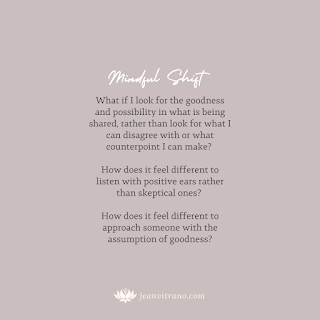I have noticed that there is something particular that happens when we are not in the best frame of mind. We become disagreeable! I know that sounds too obvious. For anyone who has experience with teenagers, you know what this looks like. Some adults live constantly in this state. Whether our negative mind state is due to stress, low self esteem, exhaustion, fear, or some other unpleasant source, we can easily fall into playing the antagonist, even inadvertently. We can take the opposite side of whatever is being offered, even if it is something pleasant, benign, or neutral. It comes in the form of, "yes, but..."
I'm sure you have been on the receiving end of this before when you called someone to share something and what you got back is unexpectedly antagonistic? It can be subtle as if the person is just offering another perspective, but then you notice that the person does this often, even to things that we weren't trying to provoke, get their opinion on, or put forward as controversial.
The unfortunate result can be that the one who shares regrets doing it. It's a drag and when I am aware that I have done it -- when I get enough perspective to see what I was doing, I feel silly and I ask myself, why didn't I just take in what they said and allow it to have its own value without adding my thoughts on top? (I could go down the shame route from there, but I know that will only make my behavior even more unpleasant. What's really needed is some care. There's something that needs attention in me and it likely has nothing to do with what this person just shared. I can take care of myself and start again).
I know there is something to be said for "healthy" questioning. Teachers do it. Parents do it. Think tanks or brainstorming meetings are good places for it. Great teachers remind us to question what are taught and to discover the truth for ourselves through experience rather than rattling off some knowledge we were taught. But there is a big difference between trying something on to uncover what is true for ourselves and always looking to argue, prove a point, show off knowledge, or play devil's advocate without the "play" element. It's actually much more pleasant and interesting when I take someone's thought and give it space, see its value or the possibility in it, or what I can take from it that is good. The other person lights up, too, when they feel regarded, which is beautiful to see and experience. If I do have some hesitation, I can give the benefit of the doubt rather than knock it down. What if everything didn't have to be a fight or something to prove, but something that has potential and useful information? Why not be open to what can come?
My invitation this week is to be more welcoming, open, receptive to what is being offered. To look for the goodness, the possibility, the potential in what someone is sharing or asking, even if at first it comes in some odd form. Even the worst ideas or requests have something worth being genuinely and positively curious about. See if it feels different to be open to possibility. Brother David Steindl-Rast describes hope as "openness to surprise." What if we were to have more hope in people? The only way to know is to give them a chance.
If you came from a place where there was great distrust in others, or where you had to defend, or prove yourself, this will likely be a harder practice, so be gentle with yourself. It takes time to undo these patterns that we didn't choose. The peace and delight that comes from it is worth the work.
🕊
Jean

